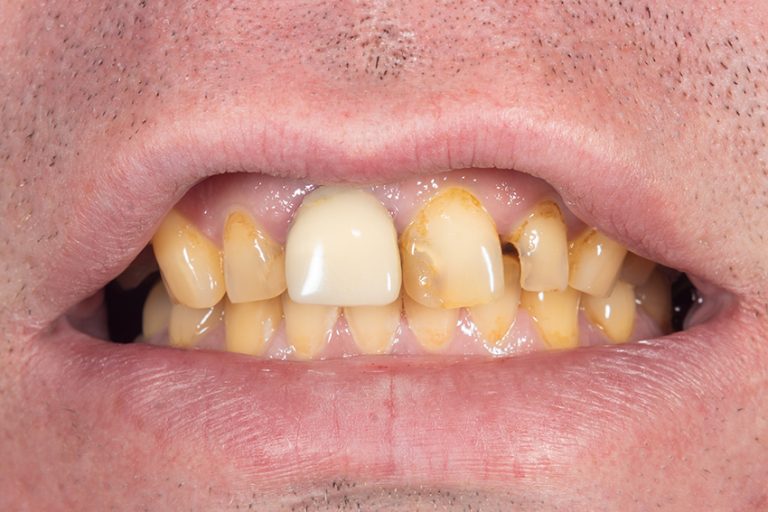
What is Plaque and How It Works
Plaque on your teeth can cause a wide variety of issues. It is important to not only brush and floss regularly, but also have regular professional teeth cleanings. Plaque carries bacteria that can damage tooth enamel and lead to cavities, but that isn’t where the damage stops.
What is Plaque?
Plaque builds up on teeth and is a soft, silky film that contains millions of bacteria. MILLIONS. This bacteria that exists in plaque can cause tooth decay and gum disease if it isn’t removed through regular brushing and flossing.
When we eat food that same bacteria will use the sugars from the food to produce acids that erode and eat away tooth enamel. This is how holes or cavities develop on the tooth surface. If your teeth become too decayed, you may need a root canal or a dental implant to replace the tooth or teeth effected.
Plaque is colorless, so it is difficult to see. If you have really heavy plaque build up, you may notice a patch of a thick white substance. that is likely plaque.
How does Plaque Harm the Body?
Unfortunately plaque can go further than just harming your mouth and teeth. If plaque is allowed to build up, it can cause the immune system to activate chronically leading to unnecessary inflammation in the body. If this is allowed to continue for a long period of time, it can cause premature aging and systemic disease.
It would be like having the flue for years, your immune system is constantly at work fighting the flu virus, meaning your body has a lot of extra wear and tear on it.
Although the body develops plaque naturally, it is harmful. Plaque buildup can not only lead to yellow teeth and cavities, but it is associated with heart diseases and dementia.
Gum Disease
Gum disease is a common thread between oral and cardiovascular health and inflammation. Gum disease is caused by bacteria and, you guessed it, plaque is what contributes and provides the bacteria.
Plaque build up has serious health consequences. It is incredibly important that you take good care of your teeth.
How to Prevent Plaque Build Up
Preventing plaque is important to your overall health as we’ve covered previously in this article. To do the best job possible, we have a list of things you can do to limit plaque and keep your mouth healthy.
- Brush after meals or at least twice per day
- Floss after meals or with brushing
- Receive regular professional teeth cleanings
- Eat high in vegetables and limit starchy carbohydrates
- See if you are a candidate for sealants
Plaque is at the its most fragile when the sugar or food has entered contact with it. So, the sooner you remove it, the easier it is. This is why brushing after a meal is ideal, but at a minimum we recommend brushing twice a day.
Flossing shouldn’t be overlooked and should be done with brushing. Taking the one-time floss sticks with you to work and using those after lunch is helpful and better than nothing at all.
It is imperative that you receive regular professional teeth cleanings because everyone has regular spots they miss in their brushing. In addition, everyone’s mouth is different and misaligned teeth can prevent a tooth brush from effectively cleaning every part of the mouth. Removing the tarter that forms beneath the gum line is essential to your overall dental health and really your overall health.
Eating more vegetables and low in carbohydrates limits the sugar you take in. And remember the plaque and the bacteria that cause plaque love sugar. So, the less you take in, the less you provide for it to grow.
If you have children, see if they could benefit from sealants. Sealants go on teeth to help protect them and prevent plaque build up on teeth.
Don’t let plaque shorten your life or cause unnecessary health issues. Schedule your appointment at Mirror Lake Dentistry today by calling 972-837-6057. We have four offices located in Forney, Rockwall, Heartland and Seagoville.
